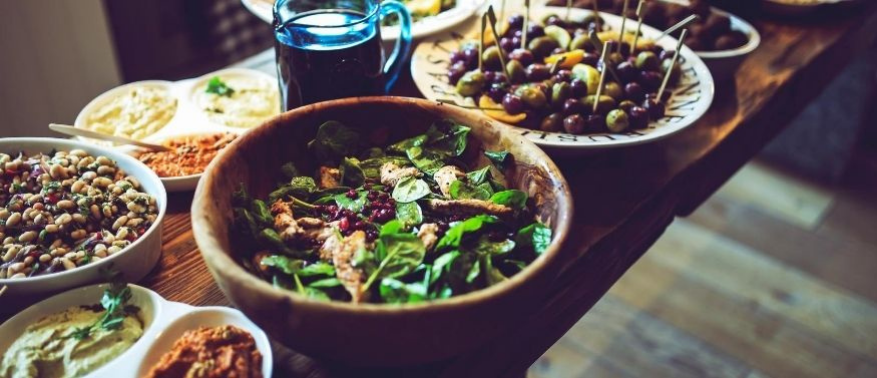You're familiar with vegan and vegetarian diets, but have you ever heard of flexitarians? In our article, you'll learn the most important facts about flexitarianism.
Table of contents
1. What is flexitarianism?
Flexitarianism is a food culture that allows meat consumption but does not make it the focus of the diet [1].
The word “flexitarian” originally comes from English and is the translation of the term “ flexitarian ”, which stands for “ flexible ” and “ vegetarian ”.
Flexitarians are flexible vegetarians and also refer to themselves as “ part-time vegetarians ” or “ weekend vegetarians .” There is no precise definition of flexitarianism.
In the Duden dictionary , a flexitarian is described as “ a person who eats a predominantly vegetarian diet but also occasionally eats high-quality, organically produced meat” [2].
So that you don't lose track of all the confusion between terms like vegetarian, vegan and flexitarian, here's a quick update: According to the German Nutrition Society (DGE), flexitarians basically eat everything, but base their diet on a vegetarian diet.
Fruits, vegetables, grains, legumes, nuts, and seeds are therefore an important part of the flexitarian diet. [3] In the flexitarian diet, meat is consumed occasionally , but not regularly .
For flexitarians, the quality of food also plays an important role. Flexitarians will not eat meat that is not produced in a humane manner [3].
Vegetarians eat predominantly plant-based foods such as grains, fruits, vegetables, nuts, seeds, and legumes [3]. All foods derived from dead animals and all products derived from them are not consumed by vegetarians [3].
Animal products such as cheese, milk, eggs, and honey may still be consumed. Vegans eat the same plant-based foods as vegetarians, but additionally avoid all animal products.
This also eliminates cheese, milk, eggs and honey, as well as everyday items made from animal body parts such as fur, wool or leather [3].
In addition to vegans, vegetarians, and flexitarians, there are also fruitarians. Fruitarians eat only plants that don't have to "die" during harvest [3].
Hardcore fruitarians eat only fruit that has fallen naturally from the tree. The German Society for Dietary Sciences (DGE) states that many people – often without knowing it – follow a flexitarian diet .
BRAINEFFECT HACK : Our POWER BALLS with their unique mix of ingredients supply your body with energy and give you the right nutrients for every situation.

2. How often do flexitarians eat meat?
The Vegetarian Association of Germany (VEBU) defines flexitarians as people who abstain from meat on at least three days a week . There are no precise or strict guidelines for limiting meat consumption.
The degree of flexitarianism is up to the flexible vegetarian to decide for themselves. Nevertheless, one can generally assume that flexitarians abstain from meat three to four days a week.
When meat is eaten , flexitarians make sure that it comes from species-appropriate husbandry and is of high quality [3].
BRAINEFFECT HACK : Don't give fatigue a chance with our KICKBAR . This smart energy bar provides you with vitamins B5 and B12 to combat fatigue. Vitamin B6 also supports your metabolism.
3. Advantages of flexitarianism
A conscious and mindful lifestyle is central to flexitarians. Flexitarians want to protect the environment , reject factory farming, shop consciously, and promote their health , which can generally be viewed as positive.
The predominantly plant-based diet of flexitarians can also be positive if implemented correctly. Flexitarians rely on plenty of fresh fruit and vegetables , whole grain products , and natural foods .
Meat and dairy products are consumed consciously and flexibly [4]. Since flexitarians do not have clear dietary guidelines, it is not possible to conduct specific studies on the effects of flexitarianism [4].
It's not possible to officially say how beneficial a flexitarian diet is for health. However, the mindful and conscious lifestyle of flexitarians, conscious food consumption, and focus on health can generally be considered beneficial.
BRAINEFFECT HACK : Our super creamy NIGHT MODE PERFORMANCE SHAKE with its special combination of nutrients is the perfect alternative to unhealthy evening snacks.
4. Disadvantages of flexitarianism
Since flexitarians are strongly oriented towards a vegetarian diet , one disadvantage could be the supply of the so-called critical nutrients.
By consciously reducing animal products, it is also important for flexitarians to pay attention to choosing the right foods.
Eating a predominantly plant-based diet does not necessarily mean eating healthily. To avoid the risk of a one-sided diet , flexitarians should pay attention to a balanced and varied diet , depending on the type of flexitarianism they practice.
Proteins , vitamin B12 , and iodine play a particularly important role here. These nutrients should also be given special attention in a flexitarian diet.
5. Conclusion
Flexitarians are flexible vegetarians who eat a predominantly plant-based diet but do not fundamentally reject the consumption of meat.
Flexitarians strive to promote their health, reject factory farming, and protect the environment. They cultivate a mindful and conscious lifestyle and purchase only high-quality, humanely raised animal products.
Flexitarians are also at risk of being deficient in critical nutrients such as protein, vitamin B12, and iodine. Since flexitarians eat a predominantly plant-based diet, a varied and balanced diet is important to avoid nutrient deficiencies.
6. Sources
[1] https://de.wikipedia.org/wiki/Flexitarismus
[2] https://www.duden.de/rechtschreibung/Flexitarier
[3] https://www.dge.de/wissenschaft/weitere-publikationen/fachinformationen/flexitarier-die-flexiblen-vegetarier/
[4] https://eatsmarter.de/ernaehrung/ernaehrungsarten/flexitarische-ernaehrung















